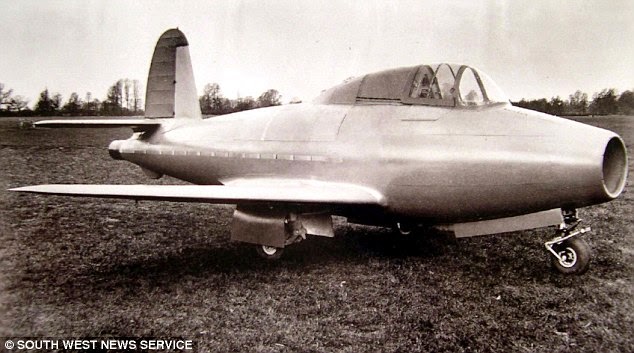Innovative: This week sees the 70th anniversary of
the first jet flight in the UK - the Gloster E.28/39, powered by
Sir Frank Whittle's turbojet design, took off from RAF Cranwell, in
Sleaford, Lincolnshire on May 15, 1941.
By Daily Mail Reporter Updated: 03:20 EST, 18 May 2011
The Allies would have crushed Nazi Germany 'within three years' if the RAF had not rejected plans by a British inventor to build the world's first jet-powered fighter planes, according to new research.
Inventor Sir Frank Whittle was told his designs for a 500mph jet were 'totally unrealistic' and RAF chiefs refused to invest a penny in their development.
It meant the RAF engineer was forced to circulate his patent internationally in the hope of finding a private investor.
But the document fell into enemy hands and was used as the blueprint for Germany's own jet development programme.
If the RAF had backed Whittle from the start, Britain's air force could have defeated the Luftwaffe's fleet of slower propeller-powered aircraft by 1942 - three years earlier than the war was actually won.
The revelations are made in new book 'JET: Frank Whittle and the Invention of the Jet Engine', which hit the shelves this week - almost exactly 70 years after Britain's first jet-powered flight.
Until now, it was widely believed that the race to design a jet-powered aircraft was fought independently between Whittle and German engineer Hans von Ohain.
But author John Golley, who researched the topic for more than 20 years, said von Ohain's efforts were made 'significantly easier' thanks to Whittle's patent.
'Whittle was allowed to file his patent without secrecy and within a few months it reached Berlin, where it was distributed to numerous aeronautical establishments,' Golley said.
'It triggered keen interest among Germany engineers and led to them developing their own jet engine aircraft, which came into operation during the last months of the Second World War.
'But Britain could have won the war by 1942 using the same technology, if the RAF had not rejected Whittle's designs at the outset.'
The history of the jet engine is as colourful as it is controversial. According to most literature, Whittle and Ohain developed similar designs in the late 1930s and had no idea of the other's existence or developments.
But after trawling through archives for two decades, Golley claims to have uncovered a very different version of events.
His research suggests that Whittle approached his boss and senior RAF engineer Dr. A.A Griffith eight years before the war started - in 1931 - with an idea to develop a jet engine, but that Griffith 'shot down his idea' on the spot.
Whittle, who had confidence in the concept, refused to be beaten and circulated a patent internationally in order to find one or a number of private investors.
Crucially, the specifics of the patent were published in their entirety, and it fell into the hands of the Aerodynamic Research Establishment (AVA) - Germany's equivalent to Boeing - which passed the document to Ohain.
Thanks to the blueprint, Ohain's efforts culminated in the Messerschmitt Me 262, which went into mass production in 1944.
Whittle's idea was eventually backed by two businessmen and Britain's first working jet-powered aircraft came into active service the same year.
But Golley argues that without Whittle's patent, Ohain and the German jet race would 'never have left the ground'.
By developing Whittle's idea and building jet aircraft at the outset of the war, the conflict could have been brought to a 'swift and overwhelming conclusion' two years earlier.
Jet aircraft fly much faster than propeller-powered aircraft and at higher altitudes - as high as 33,000-49,000 ft.
'The bottom line is that if the RAF had backed Whittle from the start then the Nazis wouldn't have developed the jet engine,' Golley said.
'This shows that the wide-spread belief that Germany invented the jet engine independently of the Brits at the same time is false.'
Whittle's son Ian said: 'For many years, my father battled to prove that his idea for jet engine technology was attainable.
'The RAF's lack of interest left him depressed and doubting his vision but to add insult to injury, it was that same genius that enabled Germany to build their own version of the jet engine.
'Golley's tireless research finally proves that Sir Frank Whittle is the undisputed father of jet propulsion.'
This week marks the 70th Anniversary of the first jet flight in the UK. On May 15, 1941, the British experimental Gloster E.28/39, powered by Sir Frank Whittle's turbojet design, took off from RAF Cranwell, in Sleaford, Lincolnshire.
London-based Datum Publishing has confirmed that a film about Whittle - based on Golley's book 'JET' - is currently in pre-production.

No comments:
Post a Comment